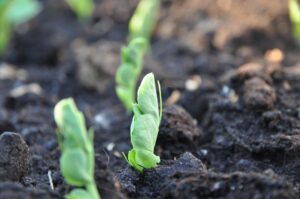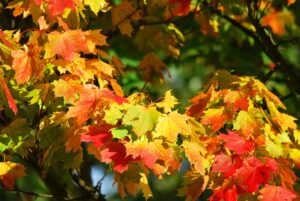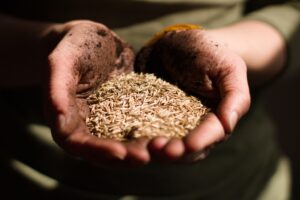With an ever-warming climate and increasingly unpredictable weather patterns, there has never been a better time
to understand the joys of mulch. Mulch is an integral part of our vegetable and ornamental gardening journey, read on for all the reasons to add mulch to your gardening routine.
What is Mulch?
Mulch, quite simply, is a covering that is applied to the soil surface to protect or insulate and is divided into two categories, organic and inorganic. Organic mulch is readily broken down and will ultimately provide nutrients and/ or structure to your soil as they do so. It is also the most common method of mulching used by home gardeners and is often affordable and practical. Inorganic mulch is considered permanent and will not break down, stone, artificial lawn or black plastic is an example of this – More often used in commercial or industrial situations where longevity is required.
What are the benefits of mulch?
Mulch really is the quiet achiever in the garden, working tirelessly to give you a much happier and healthier garden. Some key reasons why mulch should be a part of your gardening journey include:
- Reduces moisture loss, which not only saves you time and money watering, but having consistent soil moisture levels provides optimal growing conditions.
- It does a great job of suppressing weeds, saving you time and keeping nutrients for your plants and not the weeds.
- ‘Organic’ mulch provides extra organic material and nutrients to your garden, improving soil quality, structure and general health.
- It can help insulate soil and sensitive plants against snow and frost.
- Will reduce water runoff, holding water back longer so that it penetrates deeper into the soil around your plants.
- Provides an excellent habitat for worms and beneficial insects.
What types of Mulch are there?
There are many types of mulch available, and this choice depends on the type of plants you are growing, what your budget allows, what you want to achieve and what is available to you. Below are some of the easily accessible options that locally available in most Australian States.
Pea Straw or Lucerne Hay
More expensive than straw or hay but hands down, one of the best types of mulch available. Mainly used in vegetable gardens and around summer annuals, this option is packed full of nutrients, readily breaks down, is soft and pliable around young plants and for the most part contains very few weeds. When using lucerne, try to obtain first cut lucerne, this is a better quality, contains more nutrients and is less “woody” than the second cut. Both pea straw and lucerne are often only available seasonally so be sure to stock up on a bale or two.
Woodchip/ Bark
Available from local councils, arborists or your local gardening supply shop, wood chips are an excellent option for more established gardens, the slow breakdown provides a wonderful environment for worms and other beneficials to improve soil health and structure. Perfect around fruit and ornamental trees or use on paths in gardens and hothouses.
Stones
Stones are remarkably good at insulating the ground and allow all water to pass through to the soil below, however they can be very expensive and provide no nutrient to your garden. This option is mainly used to mulch succulent or dry gardens.
Basic Straw
Readily available and often a cheap option, straw provides good protection, is quick to breakdown and although provides a similar protection as lucerne, it lacks the nutrients and softness that lucerne and pea straw provide. It is best to take extra care when using around younger and softer seedlings.
Sugar Cane
Available from hardware stores and garden centres, sugar cane mulch is often the preferred mulch for many gardeners due to its relatively low cost, softness and year round availability. It also contains no weeds and readily breaks down. Sugar cane mulch is a by-product of the Queensland Sugar Industry and usually comes wrapped in plastic. If, like us, you want to minimise ‘mulch miles’ and unnecessary plastic, this might not be the option for you.
Common Grass Hay
While readily available and often well priced, care needs to be taken when using grass hay as a mulch. Generally cut for livestock from paddocks that contain several species of grass the risk of bringing in seeds and weeds into your garden is greatly increased. If you are going to use grass hay as a mulch, you may wish to expose the bail to the elements for several weeks to monitor for signs of weed germination.
Leaves/ Leaf Litter
Free and found almost everywhere, autumn leaves can be an excellent mulch. While it might be tempting to spread leaves over an area and walk away, if done too thick this can often suffocate the soil and do more harm than good. Where possible place leaves into a compost bin, keep well watered, turn regularly for several weeks until leaves have started to compost down and then apply as a mulch.
Living Mulch
Living mulch is a great option, especially for those with larger gardens. To maximise your garden’s growing areas, why not plant some zucchinis or pumpkins around the base of sweet corn or fruit trees. Prostrate rosemary, many varieties of thyme and other creeping herbs also make an excellent living mulch around more established plants.
Some extra mulching tips:
- Don’t be tempted to place mulch down to thick, remember that moisture still needs to be able to reach your soil and your plants roots. As a guide, straw based mulches should be applied approx 10-12cm thick, bark based mulch 5-7cm thick and stone mulch 3-5cm thick.
- Keep mulch slightly away from the base of plants to avoid passing on any disease or causing your plant stem to rot.
- Mulch can provide a great habitat for snails, earwigs or slaters, to avoid your tiny seedlings becoming a delicious meal for these garden pests, hold off mulching until seedlings are well established and unlikely to be an easy target.
- By spending a little extra on good quality mulch you will reduce the chances of bringing unwanted seeds and disease into your garden.
Improve your soils health and avoid worrying about your plants in hot weather. Why not get out and mulch your vegetable garden or pots today!





